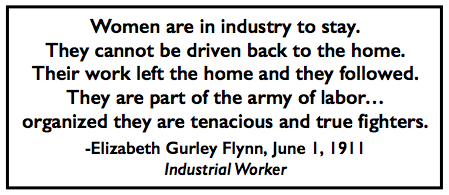 —————
—————
Hellraisers Journal – Wednesday November 5, 1913
Paterson, New Jersey – Young Weaver Tells of Conditions in Silk Mill
From The Masses of November 1913:
 —————
—————
Hellraisers Journal – Wednesday November 5, 1913
Paterson, New Jersey – Young Weaver Tells of Conditions in Silk Mill
From The Masses of November 1913:
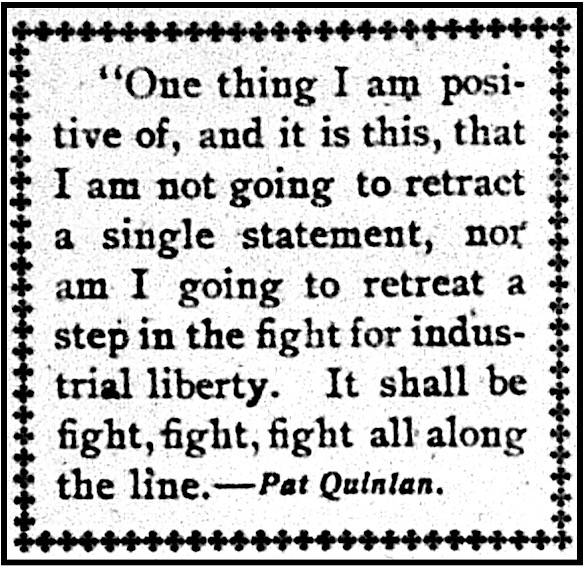
Hellraisers Journal – Thursday August 14, 1913
Pat Quinlan Released from New Jersey State Penitentiary but Soon Rearrested
From the Appeal to Reason of August 2, 1913:
—–
—–
From the Appeal to Reason of August 9, 1913:
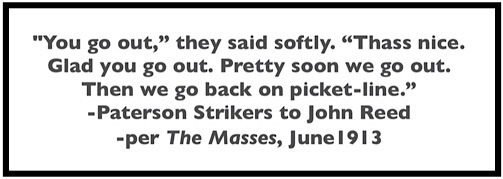 —————
—————
Hellraisers Journal – Monday August 4, 1913
Paterson Strikers Won’t Scab Under Flag; Quinlan Goes to Prison
From The Progressive Woman of August 1913:
From the Appeal to Reason of July 26, 1913
-Patrick Quinlan Taken to State Penitentiary at Trenton by Ryan Walker:
-Quinlan’s Own Story of the Paterson Strike:
 —————
—————
Hellraisers Journal – Saturday July 25, 1903
Mother Jones and Her Army March from Paterson to Passaic and West Hoboken
From the New York Tribune of July 21, 1903
-Mother Jones and Her Army Reach Passaic:
From the New York Tribune of July 22, 1903
-Mother Jones and Her Army Reach West Hoboken:
 —————
—————
Hellraisers Journal – Wednesday July 23, 1913
Elizabeth Gurley Flynn on Trial at Paterson, New Jersey
From The Richmond Palladium (Indiana) of July 19, 1913:
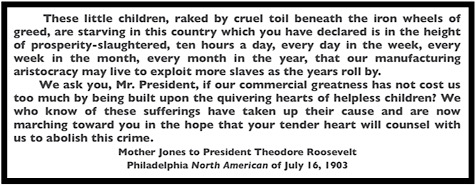 —————
—————
Hellraisers Journal – Wednesday July 22, 1903
Mother Jones Warmly Welcomed at Socialist Picnic at Sulzer’s Westchester Park
From The New York Times of July 20, 1903:
“MOTHER” JONES IN THE CITY.
———-
She Is Warmly Welcomed by the Socialist
Democrats at Westchester Picnic.
“Mother” Jones was the guest of honor yesterday [July 19th] at the annual picnic of the Socialist Democratic Party at Sulzer’s Westchester Park.
‘There were 4,000 persons present, and much disappointment in the afternoon when “Mother” Jones did not appear as she had promised. She arrived in the early evening, however, and was given a rousing welcome. Escorted by a committee to the platform in the pavilion, she had to wait some minutes before she could be heard.
[She said:]
I will be here with my children from the textile works Thursday evening, when I will address you at some length. I am too tired to do so now, and as you see, I am very hoarse.
There is one thing I must tell you, and that is, that I am going to complete the journey to Oyster Bay with my army to see the President. The newspapers say he will not see me. I am going there to find out if he is the President of the capitalists only, or whether be is the President of the workingmen too. If he is the President of the capitalists only, he will be wiped out at the next election.
At the conclusion of her remarks “Mother” Jones was escorted about the park. She was deeply interested in the tests of strength, particularly the work with the sledge hammer, and praised the workingmen for the power they showed in their play.
She was attracted by the neatly dressed children for whom many entertainments had been arranged, such as egg races and skipping the rope for prizes. She said she was glad they could play and had a chance to go to school. Watching the many drinking beer, she remarked that if they would save the drink money they would have more with which to win strikes.
The committee in charge promised “Mother” Jones that they would have Cooper Union engaged for her Thursday evening, or Madison Square Garden, if possible. They asserted that if they could get the big garden it would be overcrowded with the union workingmen and women of New York.
[Photograph and emphasis added.]
 —————
—————
Hellraisers Journal – Tuesday July 21, 1903
Mother Jones and Her Army Reach Paterson; Mother Speaks at Socialist Picnic
From the New York Tribune of July 18, 1903:
From the New York Tribune of July 19, 1903:
From the New York Tribune of July 20, 1903:
 —————
—————
Hellraisers Journal – Sunday July 13, 1913
Paterson, New Jersey – Trial of Miss Flynn, Quinlan to Prison, Striker Murdered
From Solidarity of July 12, 1913:
From The Topeka State Journal of July 3, 1913:
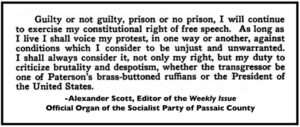 —————-
—————-
Hellraisers Journal – Thursday July 3, 1913
The Conviction of Alexander Scott, Editor of the Weekly Issue
From the International Socialist Review of July 1913:
The Conviction of Alexander Scott
A STATES Prison sentence of not more than fifteen years nor less than one year, with a fine of $250, was imposed, June 6th, on Alexander Scott, editor of the Weekly Issue, official organ of the Socialist party of Passaic County, who was convicted on June 3rd on a charge of “aiding and abetting hostilities to the government of the City of Paterson,” by Judge Klenert in the Court of Quarter Sessions.
No sooner was sentence announced when Henry Carless, a Socialist attorney of Newark, and Henry Marelli, both of whom defended Scott, filed notice that a writ of error had been applied for, a copy of which notice was presented to the judge. Bail of $3,000 was fixed and Scott was later released when Samuel Ginsburg, of Passaic, furnished the bond.
Scott was found guilty and sentenced under a law placed on the statute books in 1902 shortly after the assassination of President McKinley, but never before invoked in the State of New Jersey. Scott’s indictment was caused by the publication of editorials and pictures in the Issue in which the police, especially Chief Bimson, was characterized as the “boss anarchist” and the “boss strike-breaker.”
Scott’s conviction practically makes it a crime for any paper to criticize public officials, and makes the constitutional guarantee of free press a dead letter. In the prosecution of the case the state contended that the police were a part of the city government and that ridiculing the police was ridiculing the government.
“If we can’t criticize a policeman for his brutality, we might as well give up publication of newspapers in this country,” remarked a prominent newspaper man who was a visitor in court when sentence was imposed on Scott. He was highly indignant over the sentence, and said he would start a nation-wide movement to have the Scott verdict reversed.
That the authorities of Paterson have made up their minds to suppress the Issue was evidenced by the fact that they forced the sentence of Scott as soon as he was convicted. Though Patrick L. Quinlan, the silk strike leader, was convicted several weeks ago, the authorities made no move to sentence him, but they hurried the sentence of Scott.
While Scott’s case was rushed through, the authorities have made no move to prosecute the policemen who stole an edition of the Issue by breaking in the Socialist party headquarters and taking possession of 5,000 copies of the paper. The policemen are now out on $200 bail each, while Scott’s bail is fixed at $3,000.-N. Y. Call.
While the lawyers were arguing over technicalities, Scott, unconcerned, was busily engaged noting the proceedings in a notebook. “I am in the fight to win, and I am confident of exoneration in the higher courts,” said Scott. “They cannot suppress the Issue”
But the Socialists and Industrial unionists do not propose that Scott should serve one month in prison if they can help it. The S. P. of New Jersey, will appeal to the National Socialist Party to take up the Scott case and make a nation-wide fight in his behalf.
Solidarity, the I. W. W. organ has issued a call for protest meetings. “Scott has stood by the I. W. W. and the I. W. W. must stand by him,” writes Justus Ebert.

—————-
Hellraisers Journal – Wednesday July 2, 1913
“The Paterson Strike Pageant” by Phillips Russell, Part II
From the International Socialist Review of July 1913:
[Part II of II]
The New York Press the next day said:
“The Garden has held many shows and many audiences, from Dowie to Taft to Buffalo Bill, but it is doubtful if there ever was such an assemblage either as an audience or as a show as was gathered under the huge rafters last night. In fact, it was a mixed grouping that at times they converged and actor became auditor and auditor turned suddently into actor. When more than 10,000 sang and shouted within, 5,000 outside clamored for admittance and were willing to pay double the prices to get in.”
The New York Evening World said:
“Fifteen thousand specators applauded with shouts and tears the great Paterson Strike Pageant at Madison Square Garden. The big mill aglow with light in the dark hours of early winter morning, the shrieking whistles, the din of machinery-dying away to give place to the Marseillaise sung by a surging crowd of 1,200 operatives, the fierce battle with the police, the sombre funeral of the victim, the impassioned speech of the agitator, the sending away of the children, the great meeting of desperate hollow-eyed strikers-these scenes unrolled with a poignant realism that no man who saw them will ever forget.”
No spectacle enacted in New York has ever made such an impression. Not the most sanguine member of the committee which made the preparations for the pageant believed that its success would be quite so overwhelming. It is still the talk of New York, most cynical and hardened of cities, and will remain so for many days.
There were times when the committee were assailed with oppressive doubts. When one sat down and thought it over in cold blood, the idea of arranging for and carrying through such a thing in two weeks’ time seemed almost grotesque. Outside of the mechanical difficulties involved, the multitudinous details to be attended to, the advance outlay of money that would be necessary seemed to present an insuperable obstacle. There was the single item of $1,000 to be put down for the rental of one night, the $750 needed for scenery, the huge sum for advertising, all to be provided.
After plunging in with enthusiasm for the first few days, a bad reaction seized the promoters. They called a meeting in which the most gloomy forebodings were indulged in. There were disturbing reports of the small advance sale of tickets and there were serious proposals to give the whole thing up.
It was the workers themselves who stepped into the breach. Delegates from the New York silk strikers, whose cause has almost been lost sight of in the more spectacular struggle of Paterson, arose indignantly.
“What?” they cried. “Give this thing up after our people have set their hearts upon it? Never! Is it money you need? Leave it to us-we’ll raise that! We are poor. We are on strike. But a lot of us still have a few dollars left in the savings bank that we’ve been putting by through many years. We’ll get it out and lump it together. We will go to our business men and say: ‘Here, we’ve been trading with you a long time. We have helped to make your profits. Now you help us or we won’t trade with you any more.’ Never mind. You leave it to us-we will raise the money.”
And they did. Other generous people, more richly upholstered with ready cash, also came forward with contributions and in four days there was ample money with which to cover all deposits.
And it was found that the result was worth all the toil and trouble involved. The lives of most of us are sordid and grey. So tightly are we tied to the petty round of toil to which our galley-masters bind us, that most of us probably are born, live and die without experiencing one deep-springing, surging, devastating emotion. We are either afraid to feel or we have lost the capacity.
The Paterson pageant will be remembered for the sweeping emotions it shot through the atmosphere if for no other reason. Waves of almost painful emotion swept over that great audience as the summer wind converts a placid field of wheat into billowing waves. It was all real, living, and vital to them. There were veterans of many an industrial battle in that audience, though the cheeks of many still held the pink of youth.